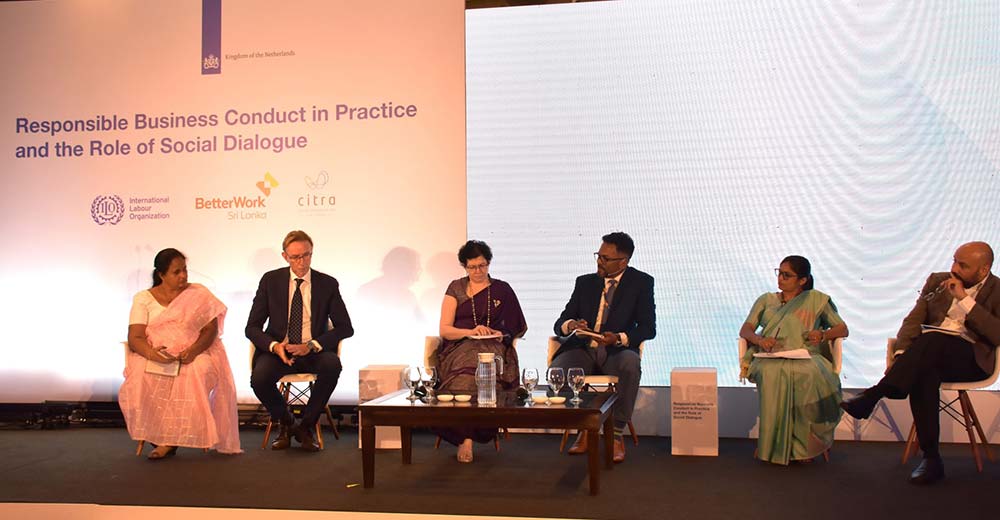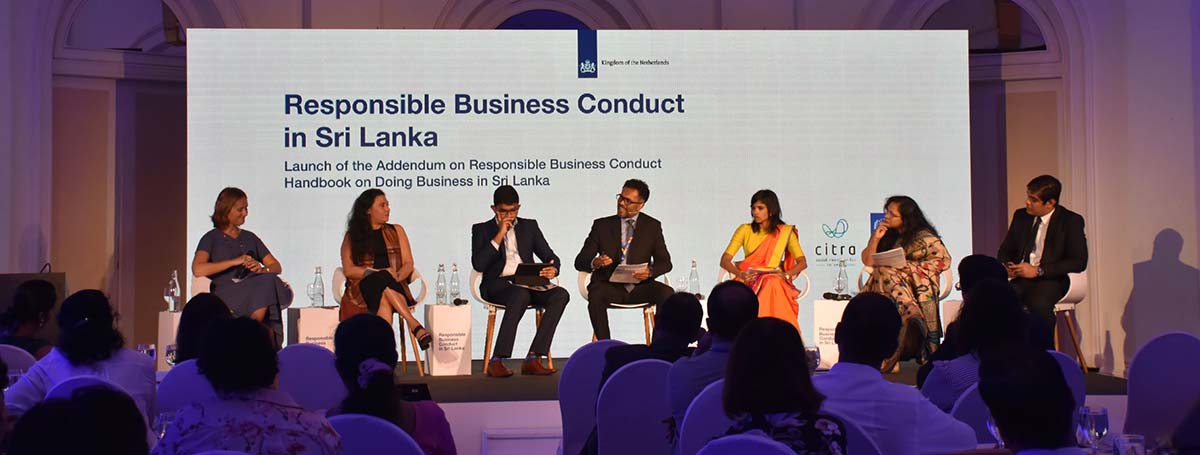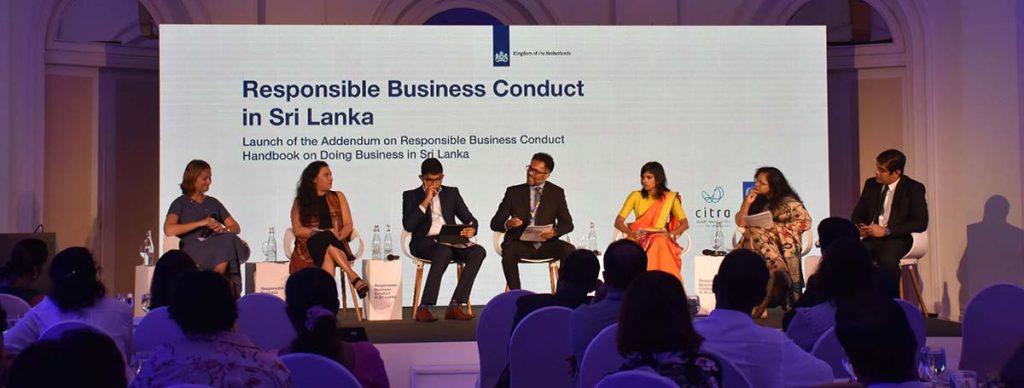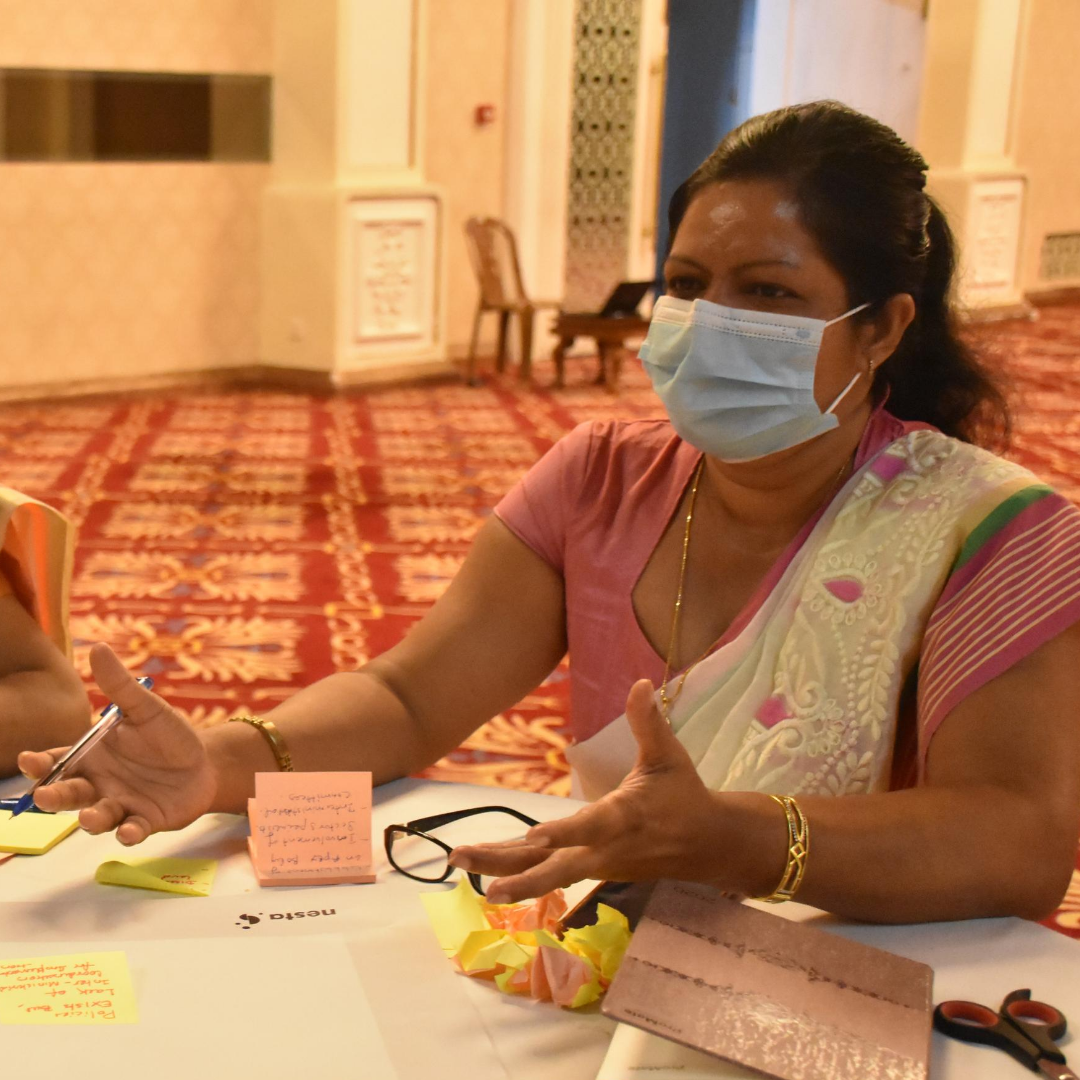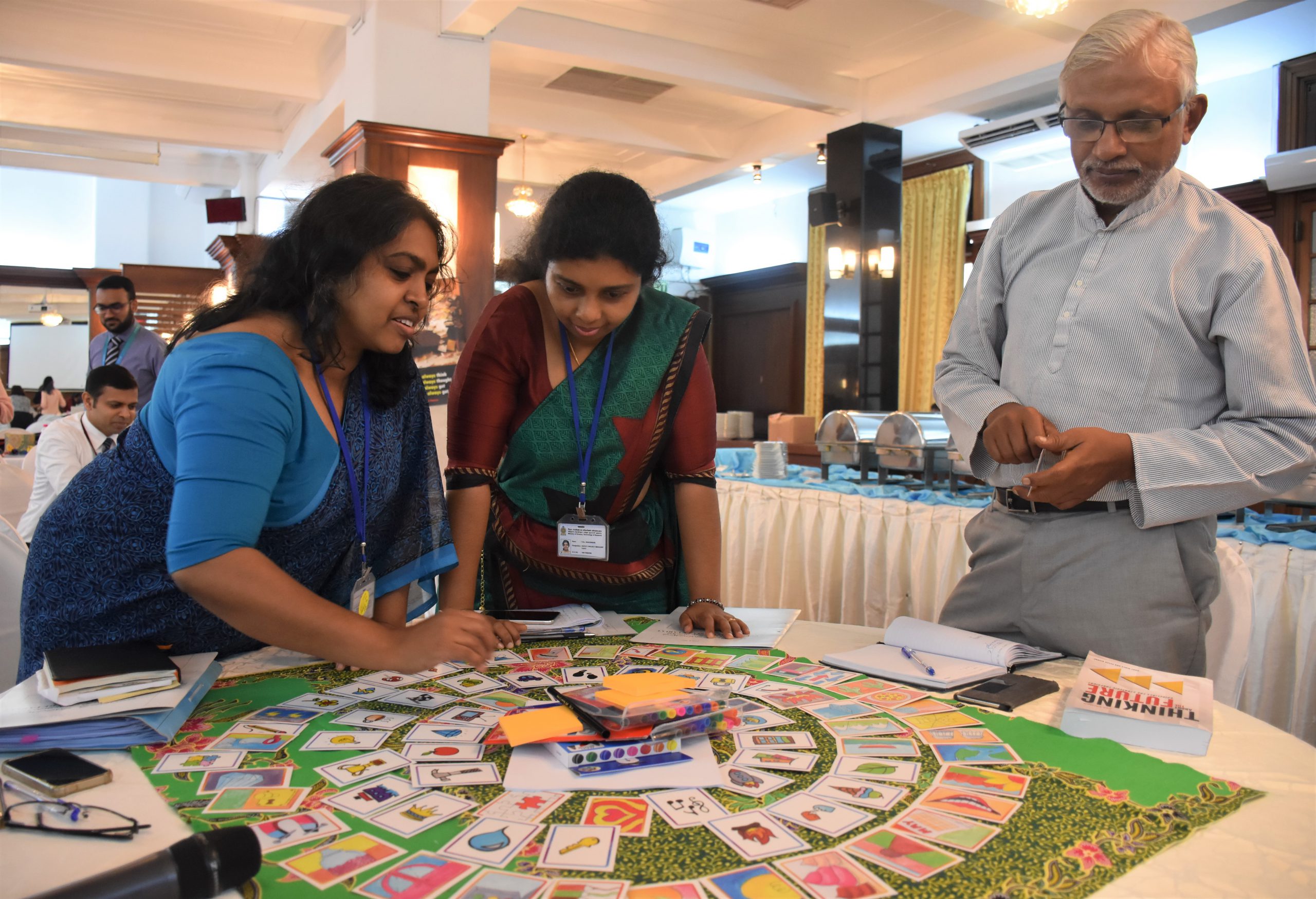UNDP and the National Innovation Agency partner to Mainstream Social Innovation in Sri Lanka
Sri Lanka’s first social innovation lab, Citra, joins hands with the National Innovation Agency to implement innovative approaches in public service delivery.

Pictured here: Prof. Ajith de Alwis, Chief Innovation Officer at the National Innovation Agency and Ms. Azusa Kubota, Resident Representative at UNDP Sri Lanka sign the Letters of Engagement
Colombo, Sri Lanka, 17 May 2023- Social innovation is the process of developing and implementing innovative ideas, products, and services to address social and environmental challenges, and is important in development as it provides new and creative solutions to complex social problems, such as poverty, inequality, and environmental degradation. With the increase in complexity and scale of social challenges, there is a growing need for more inclusive, collaborative, and innovative approaches to address these challenges thus making social innovation a highly promising approach in advancing the national development agenda to tackle some of the most pressing challenges facing society today.
 In light of this, the United Nations Development Programme (UNDP) in Sri Lanka through its innovation arm, Citra Social Innovation Lab, has partnered with the National Innovation Agency (NIA) to jointly address these challenges and work together to strengthen the social innovation eco-system in Sri Lanka.
In light of this, the United Nations Development Programme (UNDP) in Sri Lanka through its innovation arm, Citra Social Innovation Lab, has partnered with the National Innovation Agency (NIA) to jointly address these challenges and work together to strengthen the social innovation eco-system in Sri Lanka.
The National Innovation Agency was established with the specific aim of promoting a better understanding of innovation in the fields of social sciences, science and technology, defense, environment and service, and their impact on the economy of the country. Citra Lab, a joint initiative of the Prime Minister’s Office and UNDP in Sri Lanka, was instrumental in the conceptualization and design of NIA. The organization which specializes in the use of innovation and foresight tools will offer its expertise in design thinking and human-centered design to activate the social innovation pillar at the agency.
Formalizing of this strategic partnership through an exchange of letters took place recently with Ms. Azusa Kubota, Resident Representative at UNDP in Sri Lanka, and Prof. Ajith de Alwis, Chief Innovation Officer at NIA.
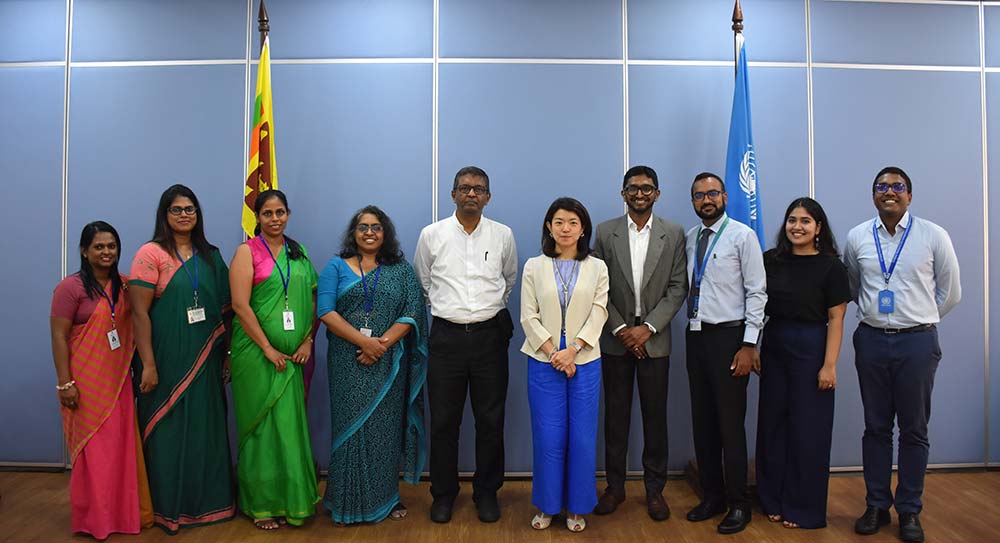 Speaking on the close partnership NIA has had with Citra Lab, Professor Ajith de Alwis expressed his enthusiasm in embarking on this journey with fellow innovation experts, adding that, “there are already several issues in urgent need of being addressed, especially in relation to embedding innovation within the public sector, along with many opportunities where this partnership will prove to be most effective”.
Speaking on the close partnership NIA has had with Citra Lab, Professor Ajith de Alwis expressed his enthusiasm in embarking on this journey with fellow innovation experts, adding that, “there are already several issues in urgent need of being addressed, especially in relation to embedding innovation within the public sector, along with many opportunities where this partnership will prove to be most effective”.
Ms. Azusa Kubota, Resident Representative, UNDP in Sri Lanka, noted how this partnership dawns at a crucial time for the country. “Sri Lanka is a resilient nation, with untapped potential across various sectors. UNDP looks forward to working closely with NIA to further strengthen the innovation landscape in the country to positively contribute to its development agenda”.
Key objectives of this alignment are centered on streamlining social innovation within Sri Lankan society, and to embed social innovation into national development efforts to achieve sustainable human development. The nature of this cross-sector partnership will enable stakeholders to co-construct and implement socially innovative solutions which will address socio-economic issues, create positive social impact, and enhance the well-being of communities.
For more information, contact [email protected]
The Embassy of the Kingdom of the Netherlands and ILO convenes a discussion on ‘Responsible Business Conduct in practice and the role of social dialogue
Last week the Netherlands embassy in collaboration with Better Work Sri Lanka Programme, a joint
initiative between the International Labour Organization (ILO) and the International Finance
Corporation (IFC), concluded their series on responsible business conduct (RBC) focusing on the
apparel sector.
This third session focused on the apparel sector and the importance of dialogue, bringing together a
range of industry experts. The event, supported by the Joint Apparel Association Forum Sri Lanka
(JAAF) saw the participation of high-level representatives who discussed and shared their experience
of RBC in practice and the importance of social dialogue.
Social dialogue is critical to the apparel sector in Sri Lanka as it enables all stakeholders to come
together and discuss matters related to the industry i.e., safety standards, working conditions,
environment and labour standards. It can help to ensure that worker welfare is improved, and their rights are protected which in turn promotes stability, enhances productivity, and ensures that the
industry operates in a sustainable and socially responsible manner.
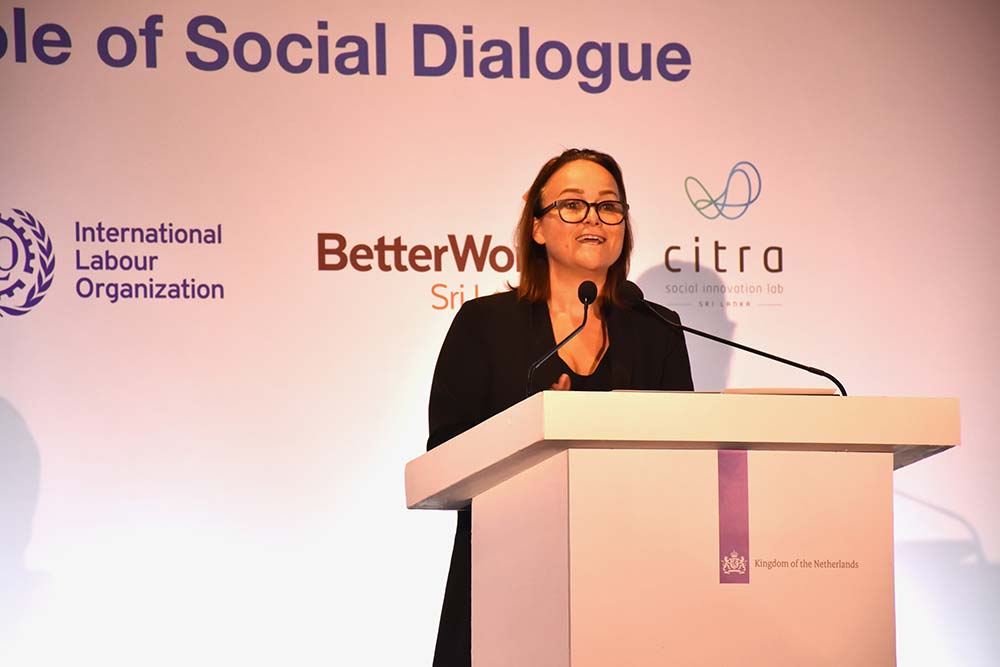 Giving the opening remarks at the event the Ambassador of the Kingdom of the Netherlands to Sri
Giving the opening remarks at the event the Ambassador of the Kingdom of the Netherlands to Sri
Lanka and Maldives, H.E. Bonnie Horbach stated “Doing business responsibly whether at home or
abroad, is something the Netherlands government finds extremely important. What drives this
agenda is the sincere wish to do better and acting responsibly. The era of ‘take-make-dispose’ and
‘exponential growth without consequences’ has to be replaced. It’s time for a new era with a greater
focus on quality and sustainability. We need to move towards understanding what the impact of a
business is, throughout the entire supply chain – both environmental point as well as from a social
one.”
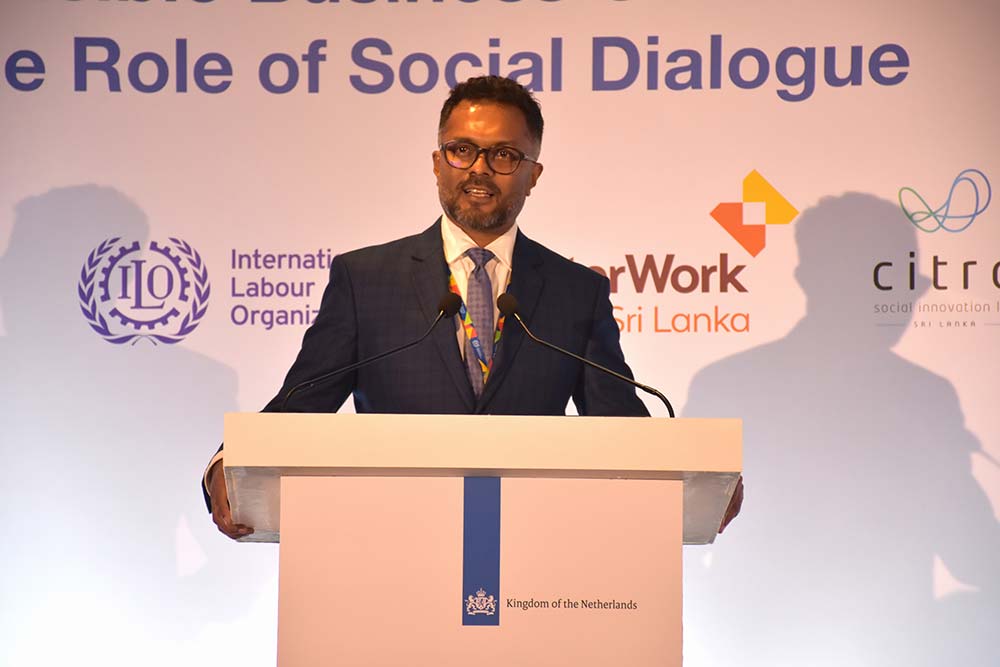 Highlighting the importance of social dialogue, Mr. Indika Gamage – Group Manager Human
Highlighting the importance of social dialogue, Mr. Indika Gamage – Group Manager Human
Resources Development, Jay Jay Mills Lanka (Pvt) Ltd, spoke on his experience in promoting RBC
within the apparel sector in Sri Lanka.
Speaking at the event on the Government of Sri Lanka’s role in embracing RBC, Ms. Thilaka
Jayasundara, Secretary, Ministry of Industries stated that “The Ministry of Industries is focusing on
obtaining the International Accreditation Certification and is working with 21 sectors to encourage
them to adhere to international standards, whilst also supporting them to obtain certifications.
Additionally, since the apparel industry contributes a significant percentage to the export income of
Sri Lanka compared to other sectors, we find that adapting to European regulations within this sector
is especially important.”
Noting the importance of RBC for the future of Sri Lanka’s trade with the European Union, Mr. Lars Bredal, Deputy Head of Delegation of the European Union to Sri Lanka and the Maldives mentioned,
“There are new legislations being drafted making it mandatory for European companies to certify
that any product received has not in any way contributed to climate change or had a reverse impact
on human rights. Sri Lanka has in many ways been ahead of the curve for issues such as child labour,
yet Sri Lanka has room to improve in other areas, such as equal pay. It would be best to address
these issues before the new legislation enters into force and by doing so secure better access to
the European market”
 The panel discussion also consisted of sector experts including Mr. Yohan Lawrence – Secretary
The panel discussion also consisted of sector experts including Mr. Yohan Lawrence – Secretary
General of the Joint Apparel Association Forum Sri Lanka (JAAF); Ms. Mathavakala Mathavan –
National Project Coordinator, Free Trade Zone & General Services Employees Union; and Ms.
Chamila Thushari – General Secretary, Dabindu Collective. The discussion was moderated by Mr.
Kesava Murali Kanapathy, Head of Better Work Sri Lanka programme.
The RBC series was facilitated by the Citra Social Innovation Lab of the United Nations Development
Programme as a part of their wider service offerings to development partners.
During the first RBC event in November 2022 the Embassy launched the Addendum on Responsible
Business Conduct Handbook on Doing Business in Sri Lanka. The second event that took place in
February this year focused on supporting SMEs understand the due diligence process and
opportunities in adopting RBC as a business case.
For more information, please contact [email protected].
Embassy of the Kingdom of Netherlands brings Responsible Business Conduct to the forefront in Sri Lanka
Launch of the Addendum on Responsible Business Conduct Handbook on Doing Business in Sri Lanka
Responsible Business Conduct (RBC) as defined by the OECD Guidelines for Multinational Enterprises revolves around the key principle of due diligence, which means the responsibility of businesses to identify, prevent, mitigate, and report on risks related to their operations, products, and services. To highlight its importance and create a conversation around RBC, the Embassy of the Kingdom of the Netherlands launched the ‘Addendum on RBC Handbook on Doing Business in Sri Lanka’ yesterday in Colombo, Sri Lanka facilitated by the Citra Social Innovation Lab of the United Nations Development Programme (UNDP) in Sri Lanka, which saw the participation of high-level representatives followed by a dialogue around RBC in Sri Lanka’s context by expert panelists.
The Handbook on Doing Business in Sri Lanka provides guidance on RBC for entrepreneurs and businesses. Adhering to RBC standards is critical for exporters from Sri Lanka to the European Union and the Netherlands to stay competitive and retain access to EU markets. The Addendum compiles essential information to understand RBC, the frameworks, and actions supporting it, as well as step-by-step guidance on incorporating RBC in business operations and practices, managing risks, and accessing tools, guidelines, and relevant information.
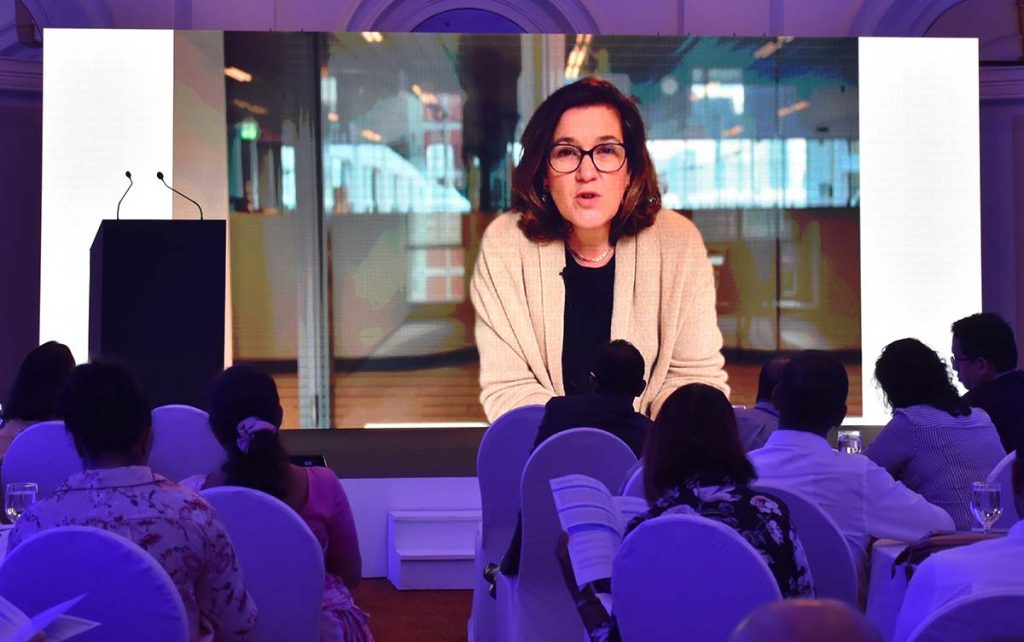 Delivering the keynote speech at the event, Nanna Stolze of the International RBC Unit, Department for Market Regulation and Trade Policy, Ministry of Foreign Affairs, Netherlands, provided an overview of what RBC is in the Dutch context and why it is important.
Delivering the keynote speech at the event, Nanna Stolze of the International RBC Unit, Department for Market Regulation and Trade Policy, Ministry of Foreign Affairs, Netherlands, provided an overview of what RBC is in the Dutch context and why it is important.
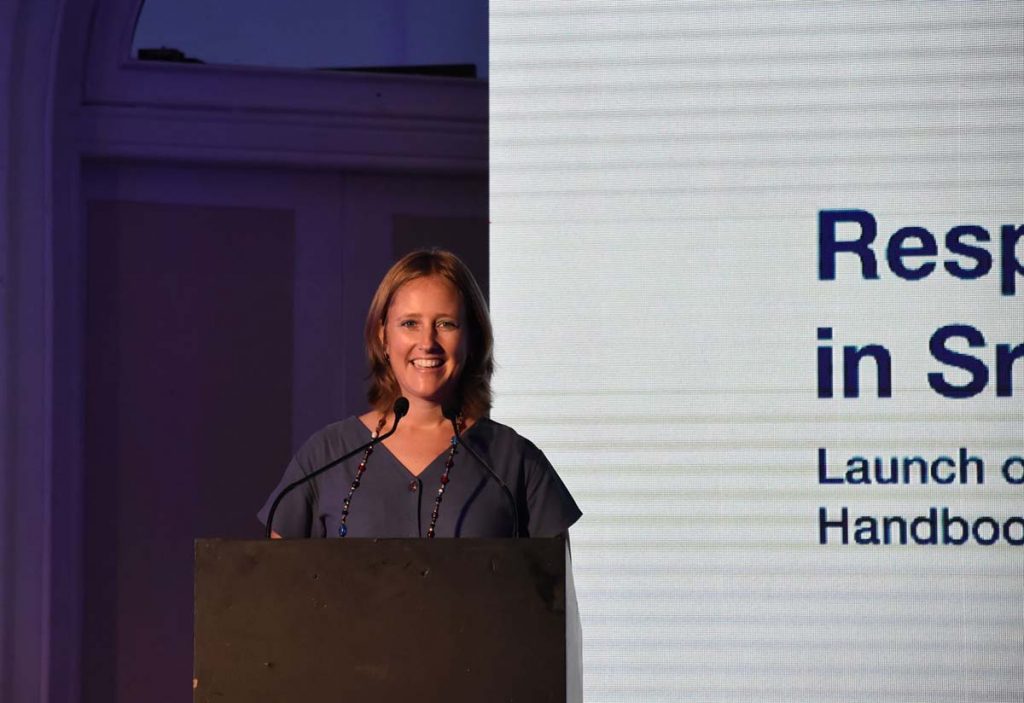 Speaking at the event, Anouk Baron, Deputy Ambassador of the Embassy of the Kingdom of the Netherlands mentioned, “To survive and build a better future, the era of bigger is better, take, make, dispose and exponential growth should be replaced with a greater focus on quality, sustainability and a move towards understanding what footprint or impact a business creates throughout its entire supply chain. We have a choice, an opportunity but also an obligation to collectively deliver on that demand as citizens, consumers, producers and policy makers.” She also went on to highlight how the Embassy aims to support businesses in Sri Lanka to prepare and embrace the shift towards RBC.
Speaking at the event, Anouk Baron, Deputy Ambassador of the Embassy of the Kingdom of the Netherlands mentioned, “To survive and build a better future, the era of bigger is better, take, make, dispose and exponential growth should be replaced with a greater focus on quality, sustainability and a move towards understanding what footprint or impact a business creates throughout its entire supply chain. We have a choice, an opportunity but also an obligation to collectively deliver on that demand as citizens, consumers, producers and policy makers.” She also went on to highlight how the Embassy aims to support businesses in Sri Lanka to prepare and embrace the shift towards RBC.
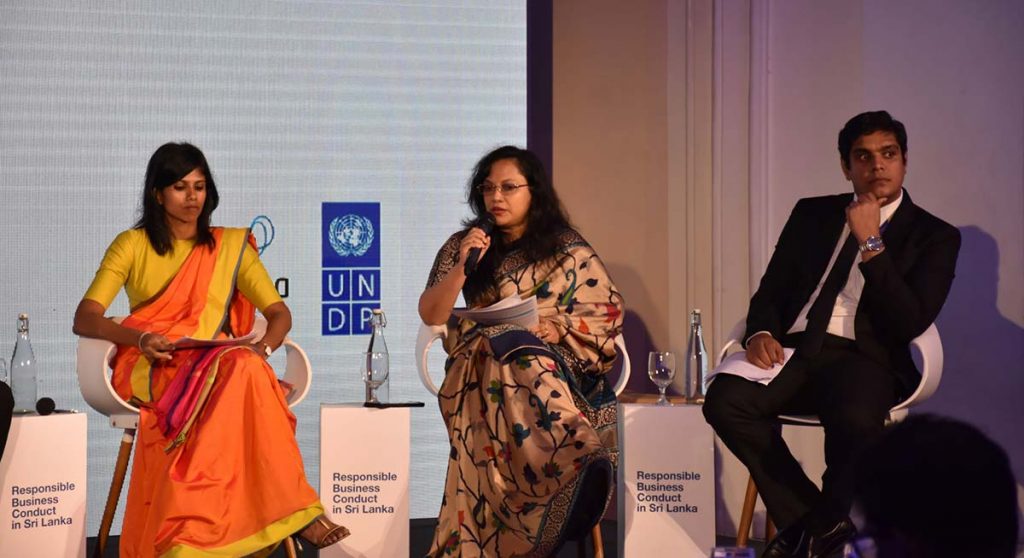 Highlighting the role of the Government of Sri Lanka, Chamindry Saparamadu, Director General of the Sustainable Development Council stated, “We have prioritized the private sector in our work at our institution and have developed a framework of private sector engagement on sustainability with a steering committee appointed to operationalize this framework with representatives from main business chambers. One of the main elements of this framework is promoting inclusive and sustainable business models through standardization, certification and reporting… Given that the Sri Lankan economy is predominantly based on SMEs, our approach is to see an industry-wide adoption of all these standards in a phased out approach to ensure a wider adoption of these standards”
Highlighting the role of the Government of Sri Lanka, Chamindry Saparamadu, Director General of the Sustainable Development Council stated, “We have prioritized the private sector in our work at our institution and have developed a framework of private sector engagement on sustainability with a steering committee appointed to operationalize this framework with representatives from main business chambers. One of the main elements of this framework is promoting inclusive and sustainable business models through standardization, certification and reporting… Given that the Sri Lankan economy is predominantly based on SMEs, our approach is to see an industry-wide adoption of all these standards in a phased out approach to ensure a wider adoption of these standards”
The panel on Responsible Business Conducted consisted of sector experts including Shiran Fernando, Chief Economist of Ceylon Chamber of Commerce; Simrin Singh, Country Director of ILO Sri Lanka; Myanthi Peiris, Business and Human Rights National Specialist of UNDP Sri Lanka; Shehan Liyanage of SLYCAN Trust (GTE) Ltd and was moderated by Murali Kanapathy, Senior Programme and Operation Officer, Better Work Programme of ILO Sri Lanka.
The dialogue, which was facilitated by the Citra Social Innovation Lab, is a part of their wider service offerings to development partners. Citra uses human centered design approaches and innovation tools such as design thinking and systemic design to ensure holistic approaches to achieve the desired impact.
For more information, please contact [email protected].
The Department of Motor Traffic (DMT) launches public call for feedback on services
Citra Lab utilizes human centered design to transform DMT to a more citizen-centric and digital institution
Colombo, 05 November 2020: The Department of Motor Traffic (DMT) has launched a public call for feedback on its services. The Department is designing a 5-year transformational roadmap with Citra Social Innovation Lab and is calling for public input on key areas to provide a more citizen centric and digital service to the public. All citizens who have received services are requested to provide their feedback at www.drivelk.com.
The DMT is utilizing systemic thinking and human-centred design approaches facilitated by Citra Lab in developing its strategic plan for the next 5 years. Citra, a joint initiative of the State Ministry of Skills Development, Vocational Education, Research & Innovation and the United Nations Development Programme (UNDP) in Sri Lanka previously assisted the DMT in re-engineering its service delivery for obtaining driving licenses at the DMT Werahera Service Centre. The Lab is now supporting the DMT in becoming more citizen-centric and digital institution within the next 5 years.
Apart from getting public input, Citra Lab together with DMT, are also mapping out the available resources across all 26 service centers of the DMT to assess the digital readiness of the Department to take on increased avenues of digital service delivery. Digital interventions will be designed based on these assessments along with public feedback to ensure the effective implementation of revised processes across the country. DMT officials will also participate in Citra Lab’s NextGenGov Fellowship Programme on foresight and innovation for public sector excellence to introduce DMT officials to innovative approaches and practical tools they can utilize in their work at the Department.
Speaking on the need for a transformational roadmap Mr. Sumith Alahakoon, Commissioner General of the Department of Motor Traffic stated “The DMT has been successful in processing the large volume of applications it receives but there is an urgent need to use innovative approaches to redesign the delivery of our services. Citra Lab has supported us in this transformational journey by using systemic processes and innovative approaches that highlighted the user’s perspective. The 5-year strategic roadmap for the DMT therefore, will ensure the people of Sri Lanka are at the centre of DMT’s processes. I urge all citizens who have used DMT’s services to support us in this journey by sharing your input at www.drivelk.com.”
Highlighting the momentum for change Mr. Robert Juhkam, Resident Representative of UNDP in Sri Lanka stated, “The DMT is a front-line service that many citizens interact with on a regular basis. The transformation of the DMT to a more user focused and digital department will therefore act as a model for other government institutions to emulate. We’re very pleased to be supporting this process by providing innovative approaches through the Citra Social Innovation Lab of the Government of Sri Lanka and UNDP.”
Commenting on the collaboration, Ms. Deepa Liyanage, Additional Secretary (Research), State Ministry of Skills Development, Vocational Education, Research and Innovation stated “The public sector needs to think differently to effectively address the challenges they face. We’re pleased that Citra Lab could assist in this process by providing innovative approaches to ensure citizen-centric service delivery for the Department of Motor Traffic.”
Citra Lab and DMT will utilize design thinking tools to prototype and test solutions to effectively address public concerns identified through the public survey on DMT’s services within the next 5 years. Together with its wide network of partners, Citra works towards embedding foresight and innovation within the public sector as a whole by strengthening institutions, building capacity and re-engineering processes.
Department of Motor Traffic initiates transformation with Citra Lab to provide a more user focused, digital service for Sri Lanka

Colombo, 27th August 2020: The global COVID-19 pandemic has highlighted the vital need for an agile public sector that can effectively respond to rapidly evolving challenges. As an institution that provides a front-line service to the public, the Department of Motor Traffic (DMT) is committed to building back better systems to deliver an efficient and people focused service to the public.
To this end, Citra social innovation lab set up as a partnership between the State Ministry of Skills Development, Vocational Education, Research and Innovation and UNDP is working with the DMT to build a 5-year transformational roadmap placing human centred design as the organisation’s central focus. Human centred design is a design thinking approach that develops solutions to problems by involving the human or user’s perspective in all steps of the problem-solving process. Citra Lab will lend its expertise on such approaches to collaborate with the DMT on re-engineering the Department to ensure a more citizen centric and digital DMT.
To begin, Citra conducted a design thinking workshop for core groups of the Department to identify the current challenges and priority areas that need to be addressed to achieve a holistic and impactful transformation. The workshop was facilitated by Citra Lab’s multidisciplinary team based on expertise and exposure to training and experiences on systemic design, sense making, foresight and human centred design with global innovation giants from Canada, UK, Moldova, Malaysia, Australia, India, and Indonesia.
 Mr. Sumith Alahakoon, Commissioner General, DMT
Mr. Sumith Alahakoon, Commissioner General, DMT
Speaking on the need for a transformational roadmap Mr. Sumith Alahakoon, Commissioner General of the Department of Motor Traffic stated “As a front-line service the DMT processes over 1.2 million driving licenses and vehicle registrations in a year and provides a considerable portion of government revenue. While the Department is successful in handling the large volume it receives, there is an urgent need to use innovative approaches to redesign the delivery of our services. The collaboration with Citra Lab on this transformational roadmap will ensure the people of Sri Lanka are at the centre of DMT’s processes.
Highlighting the momentum for change Mr. Robert Juhkam, Resident Representative of UNDP in Sri Lanka stated, “The DMT is an essential public service that many citizens interact with on a regular basis. The transformation of the DMT to a more user focused and digital department will therefore act as a model for other government institutions to emulate. We’re very pleased to be supporting this process by providing innovative approaches through Citra Lab.”
Commenting on the collaboration, Ms. Deepa Liyanage, Additional Secretary (Research), State Ministry of Skills Development, Vocational Education, Research and Innovation stated “Design thinking approaches help governments better understand its citizens, redefine problems and develop innovative solutions that we can prototype and test. Incorporating such approaches will help ensure Sri Lanka builds back better systems to increase resilience to future crises.”
Citra Lab is a proven leader in using design thinking tools to prototype and test development solutions to ensure they are agile and holistic. Together with its wide network of partners, Citra works towards embedding foresight and innovation within the public sector by strengthening institutions, building capacity and re-engineering processes.
ICTA partners with UNDP for a comprehensive and inclusive digital transformation of Sri Lanka

Colombo, 26th August 2020: The Information and Communication Technology Agency (ICTA) and the United Nations Development Programme (UNDP) in Sri Lanka signed a 4-year Memorandum of Understanding (MoU) today to support Sri Lanka’s aspirations for Digital Transformation.
ICTA and UNDP will collaborate towards the design and implementation of a comprehensive National Digital Strategy under the ‘Vistas of Prosperity’ national policy framework, with a specific focus on digital transformation of the public sector including re-engineering processes to ensure an effective uptake of digital mechanisms. The collaboration will also implement initiatives to bridge the ‘Digital Divide’ ensuring an inclusive digital transformation that leaves no one behind. In line with the national emphasis on recovery, the transformational agenda will also develop and implement a national strategy on digital economy to revitalise the economy in a post COVID-19 context. The partnership will leverage the capacity of Citra Lab, GoSL and UNDP joint initiatives and build on existing public sector excellence initiatives such as the NextGenGov Fellowship Programme, to provide capacity building support and support ICTA’s institutional strengthening and realignment to lead an effective digital transformation agenda in Sri Lanka. The transformational agenda will utilize design thinking approaches such as human centred design in the development and implementation of these initiatives to ensure the people of Sri Lanka are the central focus of the transformation. Human centred design is an approach that develops solutions to problems by involving the human or user’s perspective in every step of the problem-solving process. Citra Lab, will lend its expertise on such approaches to the digital transformation agenda to ensure a citizen centric digital transformation.
Speaking on the vital need for transformation Mr. Jayantha De Silva, Chairman of ICTA stated “ICTA is the apex ICT institution of the Government mandated to take all necessary measures to implement the Government’s policies in relation to ICT including the implementation of a comprehensive digitalization policy for the country. The global COVID-19 pandemic further highlighted the urgent need for a digital transformation of our Public Sector in order to effectively respond to evolving challenges. We are confident that this partnership will enable us to build on this momentum for change and realise our overarching goal of an inclusive, digital Sri Lanka.
Commenting on the partnership Mr. Robert Juhkam, Resident Representative of UNDP in Sri Lanka stated, “Digital transformation is a hallmark of our time and UNDP is committed to supporting national digital transformation agendas for social and economic good, including Sri Lanka. Digital investments can help both to recover from COVID-19 and enable achievement of the SDGs. This partnership will create a platform for engagement to leverage UNDP and UN sister agency expertise for efficient, citizen-centric and resilient public service delivery, innovation and economic growth.”
As an immediate next step to the signing, ICTA and UNDP will work together to conduct a digital readiness assessment for the public sector to identify gaps within the system and design interventions that can be rolled out to strengthen the digital framework.
Citra Lab facilitates design thinking approaches for the Presidential Task Force for Economic Revival and Poverty Alleviation
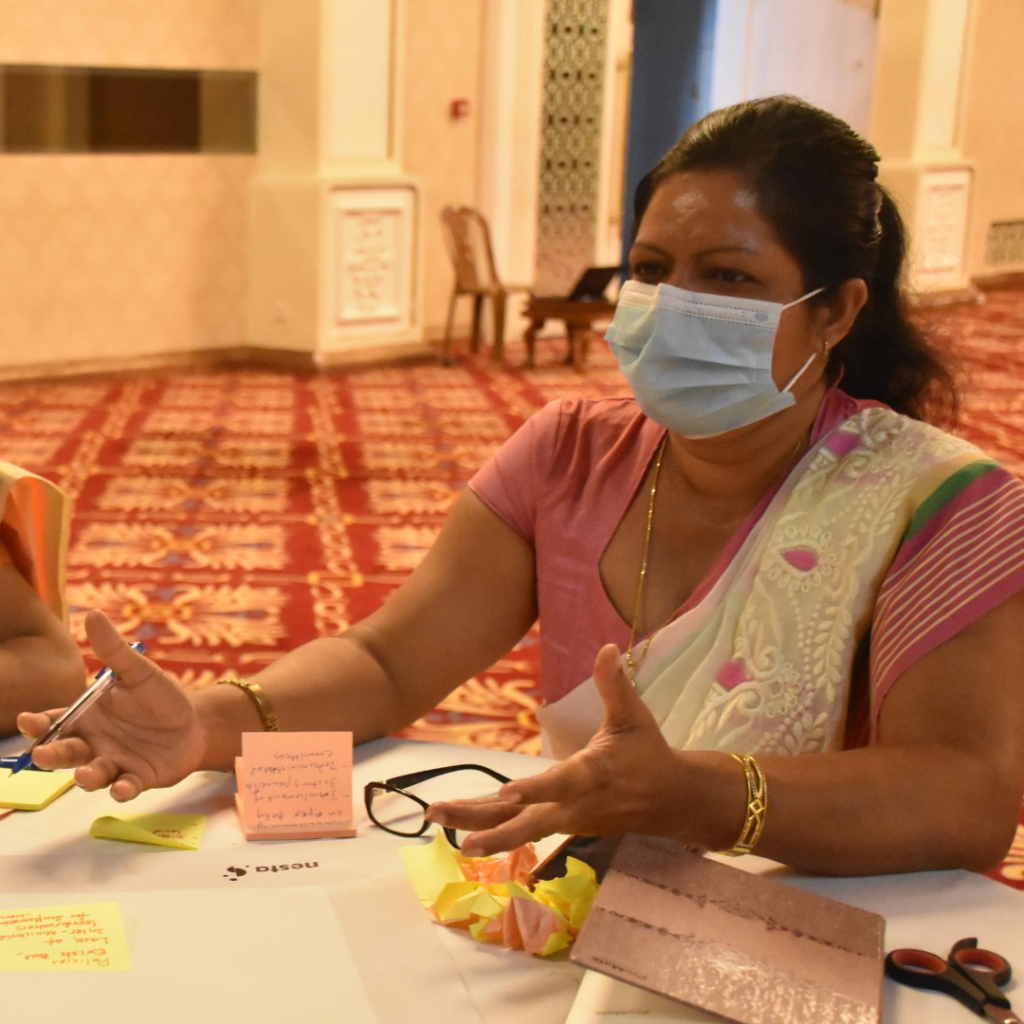
Colombo, 30th July 2020: Citra Lab facilitated design thinking approaches for the Presidential Task Force (PTF) for Economic Revival and Poverty Alleviation, to introduce practical tools and approaches to tackle larger development issues which are to be taken on by the Presidential Task Force. Citra, Sri Lanka’s first social innovation lab, is supporting the execution of the PTF’s key tasks by lending its expertise on social innovation, foresighting and human centered design to the process.
Following discussions on multiple avenues of engagement, Citra Lab conducted a human centered design thinking workshop as the first step in its broader collaboration with the PTF. The workshop was conducted for core groups of the PTF along with officials from the Office of the Prime Minister, on building an analytical and strategic approach to the PTF’s tasks with a special focus on understanding the people they are designing solutions for. The workshop, held at Temple Trees, Colombo was facilitated by Citra Lab, drawing on its wide range of experience in conducting such sessions and its multidisciplinary team that brings in expertise from different angles, having been exposed to training and experiences on systemic design, sense making, foresight and human centred design with global innovation giants from Canada, UK, Moldova, Malaysia, Australia, India, and Indonesia.


ICTA to use design thinking to increase usage of the Lanka Government Network 2.0 (LGN 2.0) within public sector
Citra Lab facilitates design thinking workshop to unpack usage of the LGN 2.0
Colombo, 10 March 2020: Citra Social Innovation Lab, facilitated a design thinking workshop on recommendations to increase usage of the Lanka Government Network 2.0 (LGN 2.0) within the public sector. The LGN 2.0, provided by the Information and Communication Technology Agency (ICTA), is a secure, private network that aims to connect all government organizations of Sri Lanka in a cost-effective and secure manner. The network has over 800 current connections across the island and ICTA is working to significantly increase the organizations connected to the network.
As Sri Lanka’s first social innovation lab, Citra provided its expertise to the process by facilitating a design thinking workshop organized by ICTA, on unpacking the current usage of the LGN 2.0. The workshop highlighted key areas for interventions and designed recommendations as a first step towards increasing usage. Relevant stakeholders including government organizations currently using the network and those that had opted to use separate networks were consulted by ICTA in the design thinking process.

Speaking on the added value of conducting design thinking sessions, Mr. Waruna Sri Dhanapala, Additional Secretary (Development), Digital Infrastructure and Information Technology Division of the Ministry of Defence, stated “The LGN 2.0 is an enhanced connectivity solution and usage of this network should be increased. Before moving forward however it was necessary to identify and address any prevailing gaps in current usage of the network. Citra Lab assisted in the first step of this process through a collaborative design thinking workshop which unpacked and identified current issues and the best approaches in addressing them.”
Citra Lab provides future-proof solutions to development challenges through a holistic approach. The team features a wide range of expertise from data science, development economics, sociology, tech for development, digital design and more. Together, the Citra team uses foresight and innovation tools to strengthen institutions, build capacity and re-engineer processes.
NextGenGov Awards Recognize Public Sector Innovation Champions

Colombo, 5 December 2019: The NextGenGov Fellowship Programme held an awards ceremony and panel discussion to recognize and inspire the 2019 cohorts that successfully completed the programme. The Fellowship Programme aims to integrate the use of foresight and innovation for public sector excellence.
Earlier this year, the Fellowship Programme introduced 60 selected public sector officials in Sri Lanka, along with international participants from 7 countries, to practical applications of foresight and innovation tools. The programme is co-developed as a joint initiative between Citra Social Innovation Lab, the Ministry of Provincial Councils, Local Government, and Public Administration, and the Sri Lanka Institute of Development Administration (SLIDA).
Following the initial workshops, an in-depth mentorship programme supported these champions of innovation as they used foresight and innovation tools to tackle ongoing issues within their ministries and departments. The culmination of the programme also featured a 2-day recap session for the participants to report back on their experiences and learn from each other.

Elaborating on the need for such a programme Secretary to the Ministry of Provincial Councils and Local Government, and Public Administration, Mr. Siripala Hettiarachchi stated “There is a strong need to facilitate innovation within the public sector that gives officials the space to develop creative and efficient processes. We need to work together through programmes such as this to empower skilled officials so they can carry out their vital role towards the sustainable growth of Sri Lanka.”
Speaking on the programme, UNDP Resident Representative, Mr. Robert Juhkam stated “The wide range of projects that strengthen institutions, build capacity and re-engineer processes that have been implemented as a result of this programme is a testament to the impact of empowering the right officials with the tools they need to create positive change.”

A panel discussion on ‘Gearing the Public Sector to Achieve the Sustainable Development Goals’ was also held at the event with Hon. Susil Premajayantha, State Minister of Foreign Relations, Mr. Siripala Hettiarachchi, Secretary, Ministry of Local Government, Provincial Councils, and Public Administration, Mr. Wasantha Deshapriya, Former Secretary, Ministry of Digital Infrastructure and Ms. Damayanthi Wijesinghe, Director of Human Resources at the Sri Lanka Administrative Service as panelists with Ms. Deshani Senanayake, Gender and Experimentation Lead Citra Lab as moderator. The panelists explored the importance of recognizing the current gaps within the public sector, the role of innovation in addressing gaps and building a conducive environment to achieve the 2030 agenda.
Together with its partners Citra Social Innovation Lab will continue to work closely with this growing network of innovation champions to ensure a sustained, long term integration of foresight and innovation for public sector excellence in Sri Lanka.
Citra Facilitates Design Thinking to Operationalize Sri Lanka’s National Innovation Agency

Colombo, 27 August 2019: Citra Social Innovation Lab, conducted several design thinking workshops on operationalizing the National Innovation Agency (NIA) in Sri Lanka. The NIA passed by Cabinet in May 2019 is set to be launched in the coming months.
As Sri Lanka’s first social innovation lab, Citra provided its expertise to the process by facilitating workshops organized by the Presidential Secretariat, on the functions, objectives and purview of the proposed apex body for innovation in Sri Lanka. Relevant stakeholders within the innovation eco system in Sri Lanka were consulted by the Presidential Secretariat in the design thinking process.
Speaking on the added value of conducting design thinking sessions, Director General of Innovation and Research of the Presidential Secretariat, Dr. Niranjala Nanayakkara stated “The Ministers of Cabinet confirmed the establishment of the NIA under the Presidential Secretariat as the apex body to align and guide the line ministries and research institutions. Before moving forward however it was necessary to identify prevailing gaps between the current innovative initiatives in the country and the required scaling up of these initiatives. The corresponding Act of the NIA which will address these concerns was built through collaborative design thinking sessions facilitated by Citra. Through its wide network of partners Citra was also able to bring in international expertise to assist us in this process.”
Citra is a proven leader in using foresight and innovation tools in prototyping and testing development solutions to ensure they are agile and holistic. As a joint initiative between the Ministry of Science, Technology & Research, and the United Nations Development Programme (UNDP), Citra facilitates creating an environment that is conducive to looking at problems from different perspectives, building capacities, and strengthening institutions.
**ENDS**

